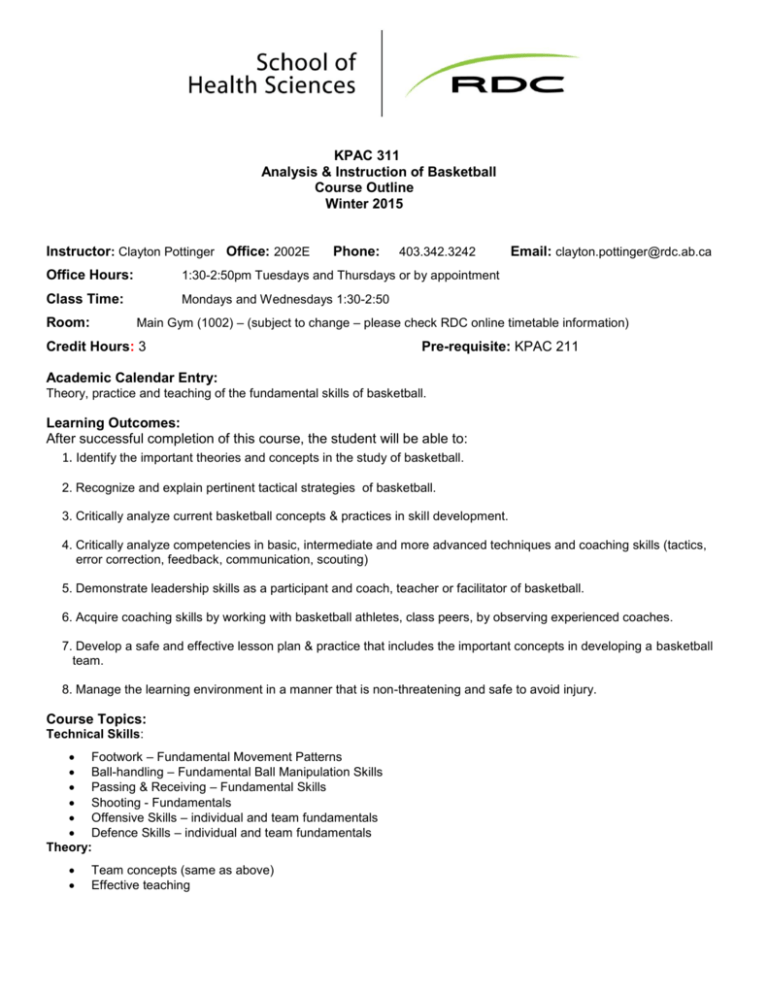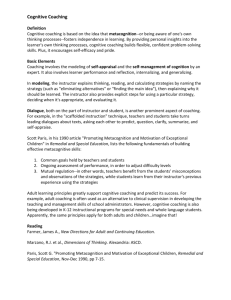KPAC 311 Analysis & Instruction of Basketball Course Outline
advertisement

KPAC 311 Analysis & Instruction of Basketball Course Outline Winter 2015 Instructor: Clayton Pottinger Office: 2002E Phone: 403.342.3242 Office Hours: 1:30-2:50pm Tuesdays and Thursdays or by appointment Class Time: Mondays and Wednesdays 1:30-2:50 Room: Email: clayton.pottinger@rdc.ab.ca Main Gym (1002) – (subject to change – please check RDC online timetable information) Credit Hours: 3 Pre-requisite: KPAC 211 Academic Calendar Entry: Theory, practice and teaching of the fundamental skills of basketball. Learning Outcomes: After successful completion of this course, the student will be able to: 1. Identify the important theories and concepts in the study of basketball. 2. Recognize and explain pertinent tactical strategies of basketball. 3. Critically analyze current basketball concepts & practices in skill development. 4. Critically analyze competencies in basic, intermediate and more advanced techniques and coaching skills (tactics, error correction, feedback, communication, scouting) 5. Demonstrate leadership skills as a participant and coach, teacher or facilitator of basketball. 6. Acquire coaching skills by working with basketball athletes, class peers, by observing experienced coaches. 7. Develop a safe and effective lesson plan & practice that includes the important concepts in developing a basketball team. 8. Manage the learning environment in a manner that is non-threatening and safe to avoid injury. Course Topics: Technical Skills: Footwork – Fundamental Movement Patterns Ball-handling – Fundamental Ball Manipulation Skills Passing & Receiving – Fundamental Skills Shooting - Fundamentals Offensive Skills – individual and team fundamentals Defence Skills – individual and team fundamentals Theory: Team concepts (same as above) Effective teaching Skill Analysis/Assessment Practice Planning Physical and Mental Training Learning Activities: Teaching in this course is comprised of lectures, on court demonstrations, on court activities, peer teaching, and community practical coaching assignments and video. Students can expect to engage in on court and small group work at times during all components of the course. Assignments & Evaluations: The final grade in this course will be computed based on the following elements. At all times the Red Deer College final examinations policy will be adhered to. 1. Online Journal and Coaching Manual 30% a. A blackboard journal must be kept detailing your activities during class and during your practical coaching assignments. Detailed instructions and topics will be posted on blackboard to guide the content and frequency of entries. Your journal should chronicle your skill improvement in the fundamentals of the game, as well as your pedagogical growth as a basketball instructor. (15%) b. A second blackboard journal will be kept to develop a personal coaching manual for future use in coaching. This manual will outline drills, teaching techniques and cues, philosophical approaches, and coaching tips discussed in class. Your coaching manual is a working document that will help you develop your technical skill in coaching basketball. Detailed instructions and topics will be posted to guide the content and frequency of your entries. (15%) 2. Practical Coaching Experience (minimum 8 hours) 25% a. 8 hours of practical coaching experience should be gained during the semester of this course. There are a variety of ways this experience could be gained: HOOPS program instruction- approximately 1 hour per week on Saturdays with a select age group. You duties would include coaching fundamental skills and providing feedback for young players. This would be done under the leadership of a head coach in charge of the HOOPS program. Note that only 12 class members would be given this opportunity over the semester. Evaluation will be based on an evaluation questionnaire completed and signed by the HOOPS head coach that outlines your hours, your duties, and your performance in the position (15%) and observations by KNSS 211 instructor (10%). Students can fulfill this portion of their mark through coaching basketball at any level within their community. All coaching assignments must be approved by your KNSS instructor. Evaluation will be based on an evaluation questionnaire completed and signed by your direct supervisor that outlines your hours, your duties, and your performance in the position (15%) and by observations made by your KNSS instructor (10%). **Due to the number of hours spent on this component, time in lieu will be given during regularly scheduled class hours. See daily course schedule for details. 3. Skill Proficiency – 20% Ongoing written and physical evaluation during the semester of your skill and improvement 4. Practice Plan – 15% a. You and 1 partner will develop and conduct a 30 min. basketball practice. The practice plan must include the following: i. age and skill level of the athletes (1-2 paragraphs) ii. purpose of the practice (objectives) (1-2 paragraphs) iii. practice length, and time allotment for each skill (one page) include drills used, with a brief description of the drill and why you’re using it iv. appropriate warm-up/cool-down v. teaching cues that you will use to help the athletes focus on skill execution (bolded) vi. any other information that is applicable (i.e. water breaks) vii. typed with appropriate practice plan layout 5. Attendance and Participation– evaluated during the semester – 10% Midterm Feedback: Midterm feedback for this course will be available from the instructor following marking of the midterm examination. After reviewing their marks to this point, students should make an appointment with the instructor to discuss their progress and concerns if the cumulative total to this point is less than 20 marks. The instructor is also available prior to this in designated office hours if students have any concerns. RDC Final Examination Policy: will be followed with respect to Final Examinations. Please review this document to ensure you understand the contents and implications of the policy. Click here to see the Final Examinations Policy Department of Kinesiology & Sport Studies ATTENDANCE POLICY: All students are expected to attend/participate in class. Attendance is taken daily. KPAC classes are activity based, so attendance is compulsory. It is the student’s responsibility in all KPAC classes to ensure that all course requirements are clearly understood. The KNSS attendance policy is clearly stated on this course outline. 2x80 minute Classes: Students with perfect attendance (zero absences) will receive 5 marks added to their final attendance grade. Students will be allowed 2 unexcused absences. Students who miss 3+ absences will lose 3.3% per missed class up to 5 classes. Students who miss 6+ classes will automatically receive a failing grade. Attendance Policy - Grade Chart – 2 x 80 minute classes Unexcused Absences 10% of overall grade 0 15% 1 10% 2 10% 3 6.7% 4 3.4% 5 0% 6 F 7 F 8 (plus) F Exceptions: Illness: If you are absent due to a serious illness, a doctor’s note is required. Authorized Leaves: In the case of absences due to authorized field trips and intercollegiate athletic competition, no penalty will be imposed. However, it is the student’s responsibility to inform the instructor at least one class prior to the scheduled event. Injury: If you are absent due to a serious injury, a doctor’s note is required. If you are unable to actively participate in class due to a minor illness or injury, you are still expected to attend class. If the minor illness/injury continues for more than 3 classes, the instructor must be notified and alternative arrangements must be made. Late Arrival to Class: Attendance will be taken at the beginning of class. If you arrive after the start of class (instructor has begun the lesson), you will be marked late. If you arrive 15+ minutes late you will be marked absent. 3 lates = 1 absence. Academic Misconduct: Please become familiar with what constitutes academic misconduct, as well as the consequences. Plagiarism involves submitting work in a course as if it were the student’s own work. Plagiarism may involve the act of submitting work in which some or all of the phrasing, ideas, or line of reasoning are alleged to be the submitter’s own but in fact were created by someone else. The complete RDC policy is available at: http://www.rdc.ab.ca/about/standard_practices/documents/student_dispute_appeal_and_misconduct_processes_policy.pdf Changes to the Course Outline: Changes to the course outline will be made with the consent of the course instructor and students. Changes will be reviewed by the Department Chairperson for consistency with College policies. Important Dates: Jan 5, 2015 January 7, 2015 January 12, 2015 February 16, 2015 February 17 – 20, 2015 st 1 day of classes for winter term 2015 Last day to apply for winter term 2015 Last day to register or add/drop for winter courses. Family Day, college closed Mid-Term Break March 4, 2015 March 13, 2015 April 3, 2015 April 15, 2015 April 21, 2015 April 29, 2015 Mid-term feedback date for winter term 2014 Final Exam schedule posted Good Friday – College Closed. First day of final exams for full year and winter term courses. Last day of final exams for full year and winter term courses Final grades available. This course may be eligible for Prior Learning Assessment. Students should refer to the RDC Course Calendar for a list of excluded courses. A plagiarism detection tool is used in this course. Classroom Learning Resources may be available to students in alternative formats. Students should be aware that Personal Counselling, Career, Learning and Disability Services are provided by RDC. Inquire about locations at Information Desk. It is the student’s responsibility to discuss their specific learning needs with the appropriate service provider. It is the student’s responsibility to be familiar with the information contained in the Course Outline and to clarify any areas of concern with the instructor. Students should refer to the Student Dispute, Appeal and Misconduct Processes Policy and Standard Practice should questions or concerns about the Course Outline not be resolved directly with the instructor. RDC offers several learning support services: course-based peer tutoring, the Math Learning Centre, the Writing Skills Centre, and help with general learning strategies (e.g., time management, study skills, exam preparation and writing). RDC also offers services for students with disabilities. To access any of these services, visit the Learning Support desk in the Library, call (403) 357-3629, or email either help_learn@rdc.ab.ca or disabilityservices@rdc.ab.ca . Personal and Career Counselling Services College life can be exciting, stressful or both. RDC professional counsellors can help students manage stress, deal with personal problems, find balance, or help with career planning. Career and Employment Services These services assist RDC students to develop their employment skills in the areas of job searching, resume/cover letters, interviewing and networking. These services also can help students to match their education in today’s job market and in their transition from student to successful employee. Counselling & Career Centre Room 1402, Main Campus 403.343.4064 Email: counselling@rdc.ab.ca or employmentservices@rdc.ab.ca Associate Dean; Date December 12, 2014






